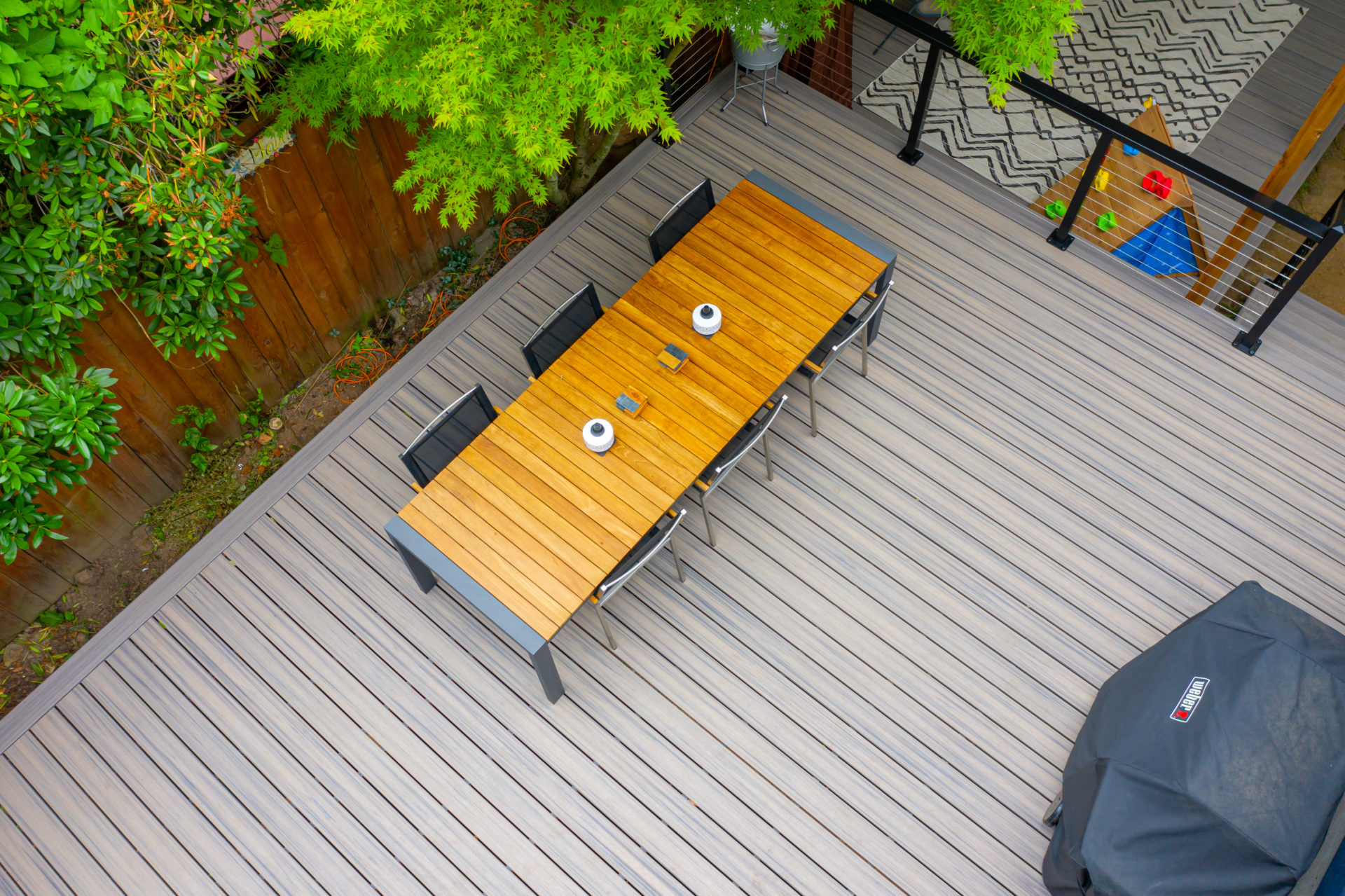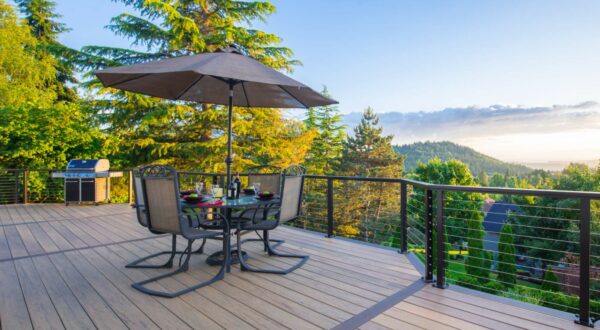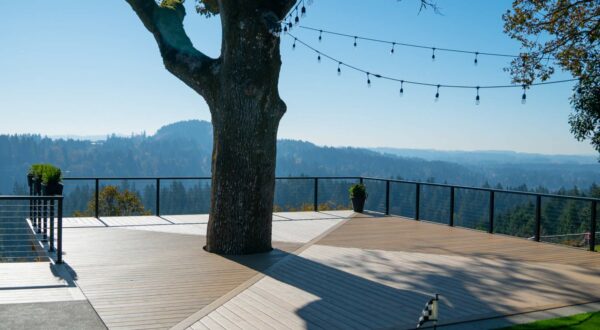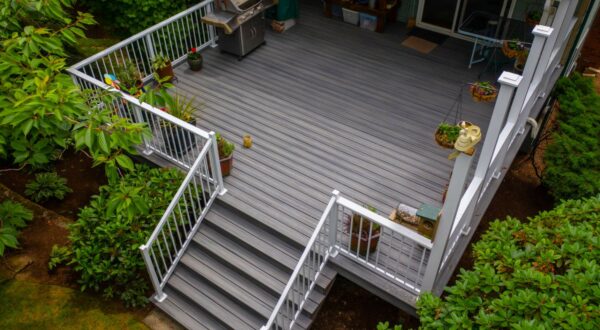Is Composite Decking Worth It? Explore the Pros and Cons of This Popular Decking Material
March 29th, 2023 | by Jim Gates

“Wood or composite? Composite or wood?”
Are you considering building a deck at home and now have these words constantly running through your mind?
Decks, whether raised platforms or ground-level, are a great way to maximize your outdoor space. The question is, which materials are the most suitable for decking, given the wide variety available on the market?
Learn all about composite decks and the pros and cons of installing them at your home.
Table of Contents
- Is a Composite Deck a Good Investment?
- 7 Factors That Make Composite Decking Worth Investing In
- Are There Any Downsides to Composite Decking?
- The Bottom Line? Composite Is Worth It, if It’s What You Want

Is a Composite Deck a Good Investment?
In short, yes.
While they often cost more than wood, composite materials promise greater durability and less maintenance. Who wouldn’t love to save time in the long run?
By lasting longer and requiring less time to maintain, composite decks have become the new industry standard.
Creating beautiful outdoor living spaces is our specialty at Three Rivers Custom Decks.
With over 25 years of combined decking experience, there is no better choice for custom decking and carpentry. Ready to build the deck of your dreams? Contact us today.
7 Factors That Make Composite Decking Worth Investing In
Compared to a traditional wood deck, composite decks cost more upfront; however, many factors make composite decking worth investing in.

#1: The Warranty
Manufacturers of composite decking materials stand behind their products and offer generous warranties.
Composite decking comes with a minimum 25-year warranty against:
- Structural
- Staining; and
- Fading damage
With this warranty, you can rest assured that your deck will last for many years to come. Investing a little more now will save you thousands in the long run.
#2: The Durability
There’s no doubt that the wear and tear of a product diminishes its value.
And when it comes to durability, there is no comparison between composite decking and traditional wood decking.
Decks made from composite materials are less likely to:
- Rot
- Mold
- Warp; or
- Become infested with insects
Its durability is what makes composite decking so valuable — it’s designed to last for years.
Composite decking is:
- Water-resistant
- Insect-resistant
- Rot-resistant
- Resilient to warping; and
- Designed to resist fading
If you’re looking for durability, composite is the way to go.
#3: The Aesthetic
While composite decking once wasn’t considered as attractive as wood decking, technological advancements have narrowed that gap.
You will always enjoy the look of your composite deck.
#4: The Selection
Do you have a specific “look” in mind for your deck? There are so many composite decking choices available, so you shouldn’t have any problem making the vision for your deck come true.
Composite decking comes in many forms, such as:
- Solid PVC plastic boards
- Composites made entirely from recycled plastic; and
- Products that blend plastics with natural fibers like wood and bamboo
From lightly colored deck boards to darker, more contemporary finishes, composite decking products are available in a variety of hues.
In addition to various materials, many manufacturers offer different grains, colors, and board styles.
#5: The Maintenance
Thanks to its low maintenance properties, you can spend more time relaxing in your garden or yard when you own a composite deck.
There’s no need to spend your time …
- Staining
- Treating
- Sanding; or
- Painting
… year after year.
In addition, cleaning a composite deck is a breeze. Simply spray with a bit of soap and water and wipe. Viola! A freshly cleaned deck.
#6: The Safety
There is no price to be placed on safety, and composite decking is usually safer than wood.
For wood decks to retain a high-quality look, they need regular maintenance. However, even with this maintenance, they are still susceptible to …
- Cracking
- Splintering
- Rotting; and
- Warping
… which can be dangerous, especially for families with small children and pets.
Do you enjoy spending your summer days barefoot? No problem! New innovations have allowed manufacturers to create heat-resistant composite decking for barefoot comfort on hot summer days.
In addition, fire-resistant materials are also built into composite decking, providing additional safety to your family.
#7: The Environment
Those looking to build a sustainable, eco-friendly home can benefit from composite decking.
Because composite decking is made from recycled plastics such as …
- Industrial and consumer waste
- Sawdust; and
- Other wood-waste materials
… it is considered an environmentally friendly alternative to other decking materials.
In addition to reducing the need for wood, composite decking helps recycle and reuse waste otherwise destined for landfills through innovative manufacturing techniques. With composite boards, you will save trees and use mostly recycled materials.
Also, since composite materials are low-maintenance, composite decks will not require regular staining or varnishing, therefore releasing no harsh toxins into the environment.
Are There Any Downsides to Composite Decking?
Is composite decking worth the money? Well, just as composite decking has its benefits, it has its drawbacks, too.
Let’s take a closer look at a few downsides to composite decking.
It May Cost More Upfront
Due to the manpower and recycled materials required to produce a high-quality composite decking product, composite decking is not the cheapest decking material available.
It is possible, however, that a composite made from lower-cost materials would be comparable to less expensive wood.
Keep in mind that although the product is slightly more expensive, its benefits, including …
- Low maintenance
- Fade-resistance
- Scratch-resistance; and
- Insect resistance
… far outweigh those of cheaper wooden decking boards in the long run.
You Can’t Change the Color
Once your composite deck is installed, you will not be able to change the color easily, so be careful to choose a color you love.
To prevent fading and reduce maintenance, composite products are permanently colored. You may be unable to modify darker colors —like grays, browns, or blacks — if you want to change them later.
Instead, wood might be a better choice for those who like to change their aesthetic every few years.
Three Rivers Custom Decks understands the importance of color choice. That’s why we offer 70 different boards to choose from, keeping our color selection as versatile as wood or other materials.
Ready to begin designing your dream composite deck? We can help. Feel free to contact us today.
It Doesn’t Look Like Wood
Wood fibers are included in some composite decking, but the material does not fall under the category of natural decking.
The look and feel of composite decking do not match that of traditional wood; however, composite decking manufacturers have improved their appearance and texture over the years.
If you are a hardcore wood lover and will not be satisfied with anything else, composite decking is not for you.
The Bottom Line? Composite Is Worth It, if It’s What You Want
At the end of the day, it comes down to what you want.
If you are looking for …
- Low-maintenance
- Slip-resistant
- Insect-resistant; and
- Rot-resistant
… then composite decking is for you.

Three Rivers Custom Decks: Portland’s First Choice for Composite Decking
You may still need guidance in selecting the best decking for your needs, given the variety of options available.
The Three Rivers Custom Decks team will be happy to provide you with a free quote to help you decide which material is best for your outdoor living space.
Contact us today to schedule your no-obligation consultation and start planning your dream deck.
